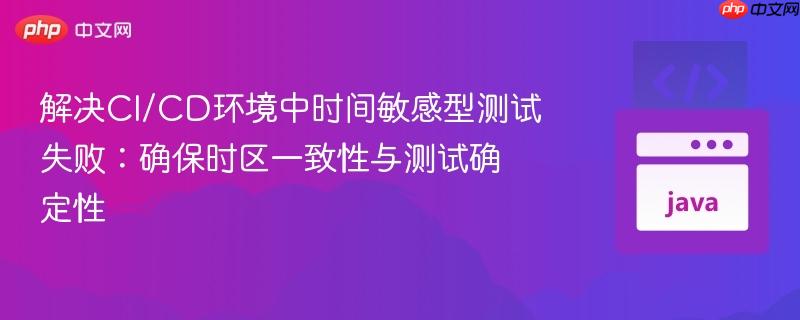
针对在ci/cd环境中时间敏感型测试因时区或系统时间差异导致失败的问题,本文深入探讨了其根本原因。通过具体代码示例,展示了如何利用junit pioneer的`@defaulttimezone`注解,强制测试环境使用特定时区,从而确保测试结果的确定性和环境独立性,避免因时区不一致引起的测试不稳定。
在软件开发过程中,单元测试和集成测试是保障代码质量的关键环节。然而,一个常见且棘手的问题是,某些测试在本地开发环境中运行正常,但在持续集成/持续部署(CI/CD)服务器上却意外失败。这类问题往往与测试对运行环境的隐式依赖有关,特别是对系统时间、默认时区等全局状态的依赖。
当测试逻辑中包含对Instant.now()、DateTime.now()或TimeZone.getDefault()等方法的调用时,测试结果就可能变得不确定。不同的机器、操作系统或JVM配置可能导致这些方法返回不同的值,进而影响测试的判断逻辑。
考虑以下一个验证日期是否为未来日期的业务逻辑及其对应的测试:
被测代码示例:
import org.joda.time.DateTime;
import org.joda.time.DateTimeZone;
import java.time.Instant;
import java.util.ArrayList;
import java.util.List;
// 假设 BadRequestException 和 Error 类已定义
class BadRequestException extends RuntimeException {
public BadRequestException(String message) { super(message); }
}
class Error {} // 简化 Error 类
public class Validator {
public List<Error> testError(String epoch) {
List<Error> listError = new ArrayList<>();
final Instant start = Instant.ofEpochSecond(Long.valueOf(epoch));
// 检查 start 日期是否为未来日期(仅比较日期部分)
if (new DateTime(start.toEpochMilli(), DateTimeZone.getDefault()).withTimeAtStartOfDay().isAfter(DateTime.now())) {
// messageByLocale.getMessage("error-message.invalid-start-date") 简化为字符串
throw new BadRequestException("Start date cannot be in the future.");
}
return listError;
}
}测试代码示例:
import org.junit.Assert;
import org.junit.Test;
import java.time.Instant;
import java.util.List;
public class ValidatorTest {
private Validator subscriptionValidator = new Validator(); // 简化实例化
@Test
public void testingError() {
// 传入当前时间的秒级时间戳
List<Error> validationError = subscriptionValidator.testError(String.valueOf(Instant.now().getEpochSecond()));
Assert.assertEquals(Boolean.TRUE, validationError.isEmpty());
}
}在本地环境运行测试时,如果本地系统时间与CI服务器时间存在差异,或者默认时区不一致,就可能导致DateTime.now()与new DateTime(start.toEpochMilli(), DateTimeZone.getDefault())的比较结果出现偏差。特别是在某些情况下,如CI环境的JVM被配置为特殊的时区,或者Instant.now()/DateTime.now()在测试运行时被意外地模拟成了“纪元时间”(1970-01-01),那么上述isAfter条件就可能错误地判断为真,从而抛出BadRequestException,导致测试失败。这种1970-01-01的现象,本质上反映了测试对时间环境缺乏有效控制。
为了确保时间敏感型测试在不同环境中都能保持一致的行为,我们必须控制测试运行时的时区环境。JUnit Pioneer库提供了一个强大的注解@DefaultTimeZone,允许我们在测试方法或测试类级别强制设置JVM的默认时区。
首先,确保你的项目已添加JUnit Pioneer的依赖。对于Maven项目,你可以在pom.xml中添加:
<dependency>
<groupId>io.github.junit-pioneer</groupId>
<artifactId>junit-pioneer</artifactId>
<version>1.x.x</version> <!-- 使用最新版本 -->
<scope>test</scope>
</dependency>@DefaultTimeZone 注解可以应用于测试方法或测试类上,它会在测试执行前设置JVM的默认时区,并在测试完成后恢复。这对于那些依赖TimeZone.getDefault()或Joda-Time的DateTimeZone.getDefault()的业务逻辑非常有效。
示例代码:
import org.junit.jupiter.api.Test;
import static org.junit.jupiter.api.Assertions.assertEquals;
import java.time.Instant;
import java.util.TimeZone;
import io.github.junit_pioneer.jupiter.DefaultTimeZone;
import org.joda.time.DateTime;
import org.joda.time.DateTimeZone;
public class TimezoneConsistencyTest {
// 确保测试环境的时区是CET
@Test
@DefaultTimeZone("CET")
void verifyDefaultTimeZoneIsCET() {
// 验证 java.util.TimeZone
assertEquals(TimeZone.getTimeZone("CET"), TimeZone.getDefault());
// 验证 Joda-Time 的 DateTimeZone
assertEquals(DateTimeZone.forID("CET"), DateTimeZone.getDefault());
}
// 确保测试环境的时区是Africa/Juba
@Test
@DefaultTimeZone("Africa/Juba")
void verifyDefaultTimeZoneIsAfricaJuba() {
assertEquals(TimeZone.getTimeZone("Africa/Juba"), TimeZone.getDefault());
assertEquals(DateTimeZone.forID("Africa/Juba"), DateTimeZone.getDefault());
}
// 针对原始问题中被测代码的场景模拟
// 假设我们希望在UTC时区下测试业务逻辑,且模拟一个固定的“当前时间”
@Test
@DefaultTimeZone("UTC")
void testBusinessLogicWithControlledTimeAndTimeZone() {
// 模拟原始问题中的被测代码片段的逻辑
// if(new DateTime(start.toEpochMilli(), DateTimeZone.getDefault()).withTimeAtStartOfDay().isAfter(DateTime.now())){...}
// 1. 设置一个固定的“传入时间戳”
// 假设传入的时间戳对应 2023-10-27 10:00:00 UTC
long fixedEpochSecond = Instant.parse("2023-10-27T10:00:00Z").getEpochSecond();
Instant startInstant = Instant.ofEpochSecond(fixedEpochSecond);
// 2. 此时 DateTimeZone.getDefault() 应该已经通过 @DefaultTimeZone 设置为 UTC
DateTime startDateTime = new DateTime(startInstant.toEpochMilli(), DateTimeZone.getDefault());
// 3. 为了避免 DateTime.now() 的不确定性,这里需要一个可控的“当前时间”
// 假设在测试场景中,我们认为“当前时间”是 2023-10-27 09:00:00 UTC
DateTime mockCurrentDateTime = new DateTime(Instant.parse("2023-10-27T09:00:00Z").toEpochMilli(), DateTimeZone.getDefault());
// 4. 执行原始条件判断:startDateTime 的日期部分是否在 mockCurrentDateTime 的日期部分之后
// startDateTime.withTimeAtStartOfDay(): 2023-10-27 00:00:00 UTC
// mockCurrentDateTime.withTimeAtStartOfDay(): 2023-10-27 00:00:00 UTC
boolean isFutureDate = startDateTime.withTimeAtStartOfDay().isAfter(mockCurrentDateTime.withTimeAtStartOfDay());
// 在这个模拟场景下,isFutureDate 应该为 false (27号不晚于27号)
assertEquals(false, isFutureDate, "日期不应被判断为未来日期");
// 5. 进一步验证一个真正的未来日期
long futureEpochSecond = Instant.parse("2023-10-28T10:00:00Z").getEpochSecond();
Instant futureStartInstant = Instant.ofEpochSecond(futureEpochSecond);
DateTime future以上就是解决CI/CD环境中时间敏感型测试失败:确保时区一致性与测试确定性的详细内容,更多请关注php中文网其它相关文章!

每个人都需要一台速度更快、更稳定的 PC。随着时间的推移,垃圾文件、旧注册表数据和不必要的后台进程会占用资源并降低性能。幸运的是,许多工具可以让 Windows 保持平稳运行。

Copyright 2014-2025 https://www.php.cn/ All Rights Reserved | php.cn | 湘ICP备2023035733号